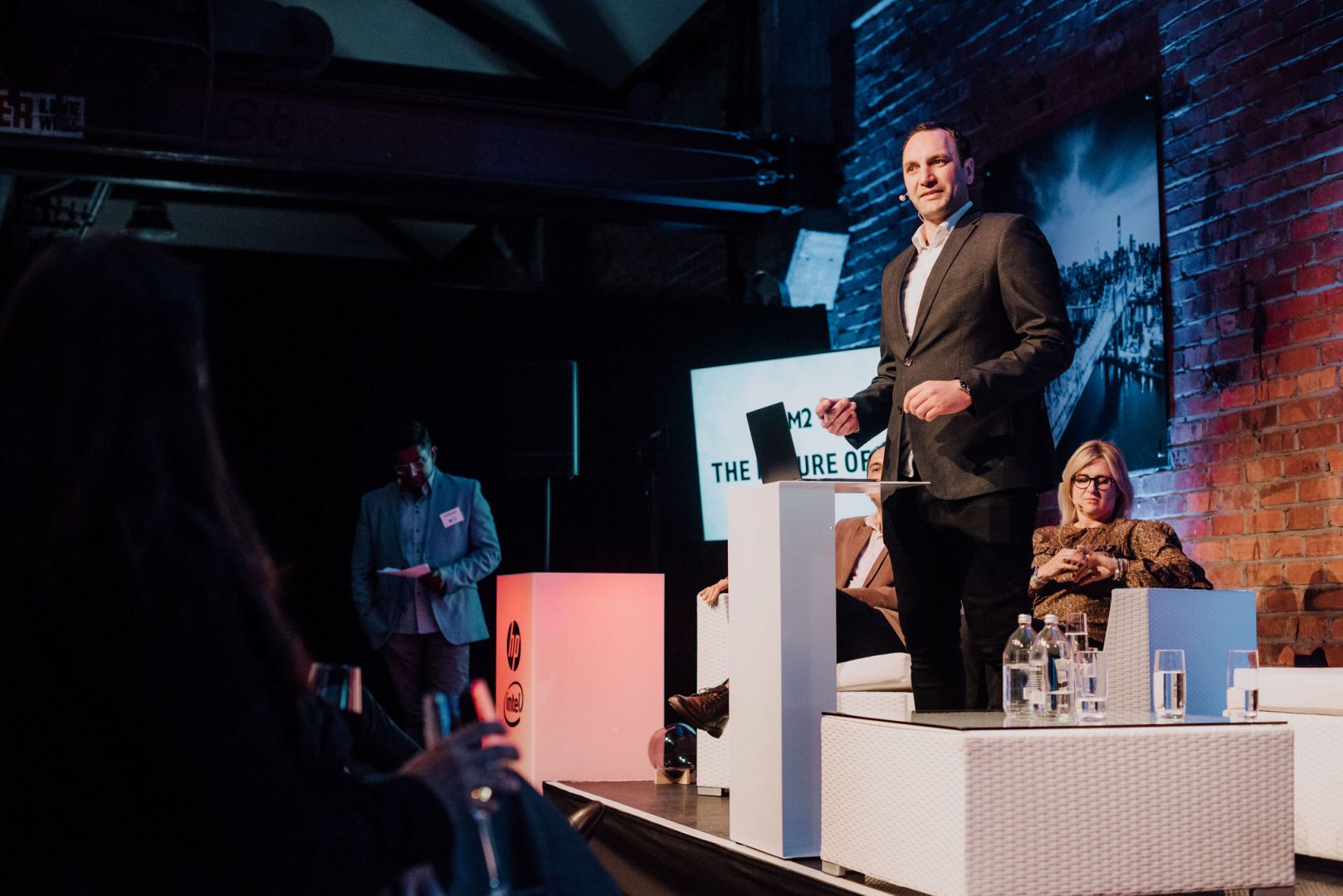The Future of Work, and What It Will Look Like
After work on Wednesday 16 October, M2 and HP teamed up discuss the exponential changes in the future of the way we will work.
Sixty-five percent of children now entering primary school will hold jobs that currently don’t exist. (Source: World Economic Forum)
This event also doubled as the NZ launch of the powerful and sleek HP Elite Dragonfly. Purpose built for the flexible and “on the go” nature of our changing work lives.
Our panel was comprised of four people who are helping shape the way we work:
Andy Dharmani
The founder of Ako which is a breed of locally-based tech company that is creating AI powered digital assistants. Prior to that, Andy was one of the original 10 employees of 2degrees at launch and built the critical IT systems that allowed to it grow into the player that it has become today.
Melanie Reece
A founding director of Cataliize Global Innovation who helped set up a global network of 170 on-demand entrepreneurs to help mid-stage companies with their global launch plans.
Andy Higgs
On the Executive Team at Fintech Venture Studio Centrality, where he leads a portfolio of startup and early-stage ventures in the blockchain space. His governance roles include Directorships at Rotorua Economic Development (RED), Blakeley, City On and CentraPass.
Kathryn Wilson
After launching her footwear label in 2003 when she was just 22, Kathryn Wilson has created an iconic brand that is recognised globally. She is now not only recognised as one of the country’s leading designers but also entrepreneurs.
Andy Higgs, how do you think the way that we work is going to evolve over the next 10 to 20 years?
Andy Higgs: I’m in the startup space and I think the world that we’re in, there are a lot of problems out there. There’s plenty of scope. There are industry specific answers and then there arecountry specific answers so you just focus on the healthy ecosystem that we’re in in New Zealand. I think it’s pretty fluid, pretty balanced. There’s no correct path.
If you get on the ladder, you get off the ladder trying to solve a problem, startup doesn’t work, become a consultant, work for Callahan, go back. It’s pretty fluid. I think the days of middle management has come to an end. The fat cats and the banks, the Fonterras, the corporates; those days are over.
You can’t be a middle age white male and just take a $200,000 salary and get away with it anymore. You do have to be adding value and that’s a big part of it. There’s nothing more humbling than starting your own business and starting from the bottom and solving real problems. I think that is where I think a lot of us will find ourselves, so it’s about collaboration. It’s about community, it’s about being a good fit. It’s about connecting. And I think in a place like New Zealand, you will thrive.
Have you got any advice for white, middle aged men on $200k and $300k salaries?
Andy Higgs: [Laughs] I think you’ve got to reinvent yourself. You got to keep reinventing. I haven’t followed a traditional career path and sometimes I regret that. I’m hoping it’s going to pay off one day. But, I think you’ve got to be flexible.
It is challenging. I’m in my forties and a lot of my peers are not young anymore and you do have to keep an open mind. I think the startup spaces are really exciting because you can be your own boss. You can create your own future and if it doesn’t work, NZTE or Callahan Innovation will probably take you up.
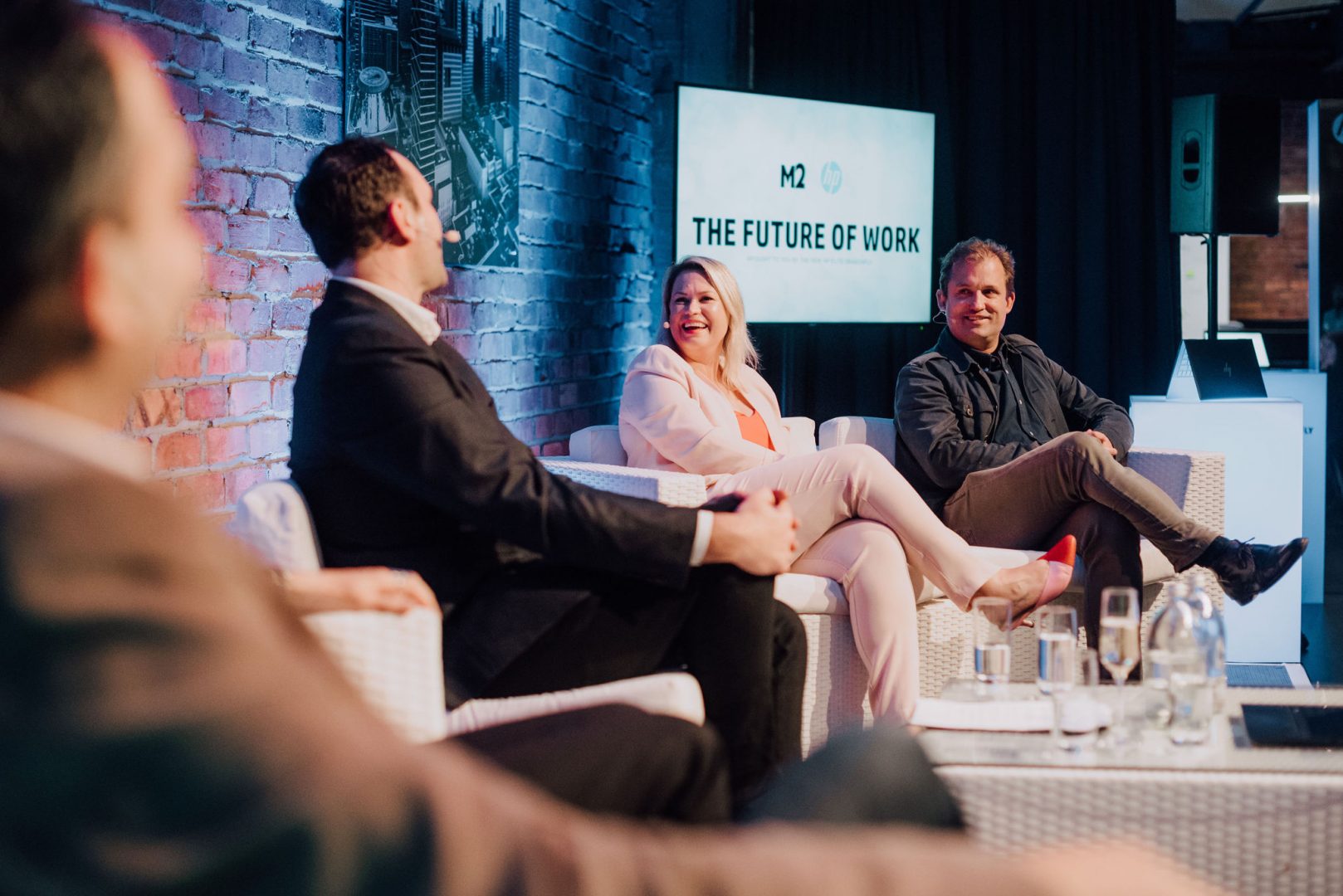
Will we see more CV’s like you’ve got with a less traditional career path with so many different roles?
Andy Higgs: I’m probably the wrong guy because I do get bored quickly. You create something and then hand it over and let someone else take the glory. There is a lot to be said from sticking in the same spot and milking it as long as you can like they do in some corporates. It does actually pay to hedge your bets.
One of the things I was guilty of was when I was at MTV working with Brent Hansen, having a great time and didn’t realise how good it was getting very well paid and thought everything was easy. Luckily we got into a startup and had an exit but, but I wouldn’t be as as careless. I’d be much more deliberate going forward in terms of career planning and having a succession plan.
I was talking to a guy before about his digital agency and having some startups on the side, having your passion projects. I think you do have to be in control of your future. You don’t want to be a victim. You don’t want to be the guy that is not in the position to have the hard conversation with the boss because you haven’t got the options. But you also want to be committed to where you are. It is about staying in control and being more deliberate and being grateful for what you’ve got.
I think if you’re in that mindset, good things do happen to you and you are open to the opportunities when they arise, which they will arise. Because we are in a healthy place and I am thankful for being in New Zealand and we are luckier than a lot of places.
Kathryn, what’s your vision of the next 10, 20 years for the future of work?
Kathryn Wilson: I’d like to think it becomes more about happiness and what makes us happy is spending more time with people that you love or doing something you’re passionate about. It’s a privilege to be in that position and have a career where you can be excited about it every day and be able to build a team where they love it too.
Being able to do something, which at the end of the day, is making so many people happy. I work in shoes for a living so I make so many women happy. It’s also the journey of the creative career and the opportunities I can offer our team to come along on that ride with us. The more that I’m hoping to grow, it brings that journey along globally, hopefully for them.
Also, I think there’s this really exciting moment that’s happened since I was at university, that there’s so much around business for better good. People that are launching startups with the whole point of it being to pull a salary, not a profit, and then every profit goes back to something incredible. I have hands up for those people where that’s their first thought. We do what we can for all sorts of amazing charities. But then there’s this amazing new generation of people that that’s their first priority, that’s incredible.
Do you think the future is having more purpose?
Kathryn Wilson: For me, it is truly about joy. There’s this wonderful man in the room tonight, Sir Ray Avery, and he talks about being born with 30,000 days. We’re going be here for a time. We don’t know what that time is, but we might as well make it the best time we can have. And if our career can be part of that, how wonderful is that?
I think it’s shifting the needle, changing people’s lives around you, looking outside the square, pushing back. I like to be out of my comfort zone. I like to think it comes back to happiness and whatever people are doing and whatever career path brings themselves happiness.
I guess it’s a fluffy philosophy, but there’s a lot to be said about the people that are doing things now. Not even at community level, but at governance level that’s all about benefiting someone else or people around them. I think that’s what I’d like to see my daughter doing in 20 years.
When you’re creating your own business, your own brand and you’re really driving the destiny of that, do you think it’s easy to get that kind of happiness working for someone else?
Kathryn Wilson: I think you have to have a side hustle that you’re passionate about. If you’re working for someone else and that doesn’t fill every dream you’ve ever had, whether it’s something you’re doing with friends after hours or, it’s traveling. It’s whatever else that is bringing you that happiness. I like to think that when you’re in the wrong role and the wrong career, you would make a move. It’s like the wrong boyfriend.
If you’re not happy, move on. Sir Ray Avery always says to me, ‘Come on, just do it. Do amazing things and do it now.’ My father passed away when I was seven, and I don’t think that made me who I am, but I think my mother brought me up to be the biggest optimist in the world. I think we grew up thinking that the world is an amazing place and to make sure that we’re having a good time while we’re here.
Melanie Reece: If I think about the next 10 to 20 years and what I want to do with my time left on the planet, the two things that I hope to inform the workforce are climate change and inequality. There’s a couple of things that are really going to make people more determined than ever to prioritise what they do in their life by what they do 40 hours a week.
One I think is the death of capitalism as we know it now. If you look to the States and what’s going on there, Amazon’s not paying any tax in the US. Walmart is not paying people a living wage, but is banking billions. Even in this country alone, $26 billion is extracted from New Zealand by the banks that we all bank with and there should be an inquiry into it.
From a global trends perspective, I think that’s going to drive people’s decisions about where they work. Having set up the global network, we recruited 170 people around the world to give up their day jobs and actually join us in the gig economy to work on projects that are going to change the world for good.
There are the oldies like me who have had a successful career and we’re financially independent and want to spend the rest of our days on the planet doing something good. Then you hit the younger generation who are just entering the workforce. There was a very distinct trend that both of those sectors are absolutely unified in their position that they will only work for a company that aligns with their values.
It’s that middle sector and probably the less early adopter in the less affluent sector who will really struggle in making those choices. But we, as the affluent people and we as the people who are the early adopters, we have to look out for them. I had the great pleasure of working with Andy at the start of the year, with the guys at Centrality, and I am the least technical person that you’ll ever meet, but I got very, very excited about blockchain technology. It’s not because of the technology, it’s because it will inform a totally new economic model.
We are capitalism. You won’t be able to sit on billions of dollars and spy on your own population and take Russian money to change the election. You won’t be able to do that. The wealth of the community will be spread throughout the community. Your data will sit with you and only you. The death of capitalism and the new iteration of technology; in 2000 it was the internet which disrupted media and communication.
This next iteration, I truly believe will disrupt all industry and I think the people in this room alongside with me and and everyone here, we need to really start caring about our own priorities for the planet.
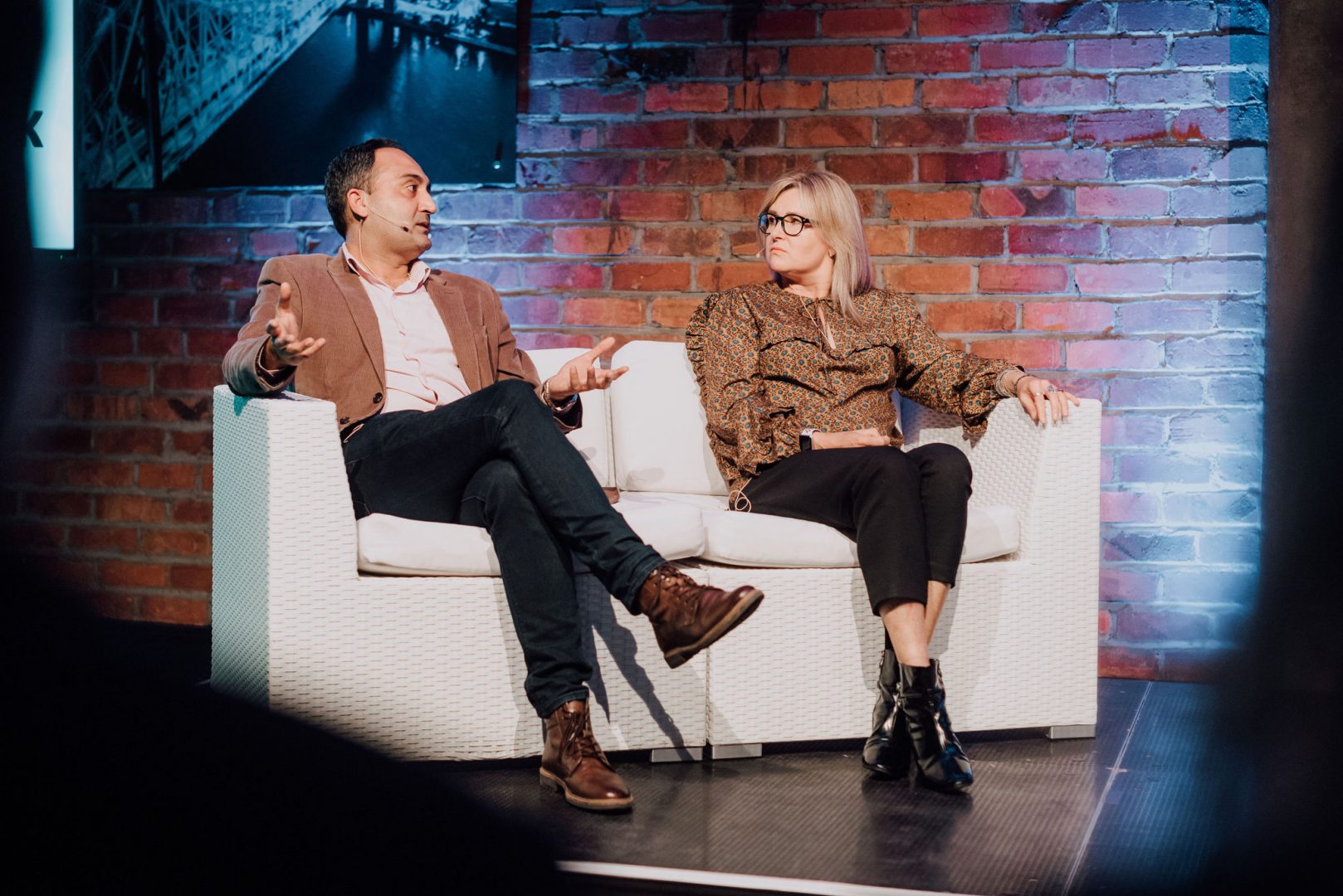
In terms of that drive towards purpose and being able to convince 170 entrepreneurs globally to give up their day jobs and come and work for a purposes, is that like a mass hierarchy of needs things?
Melanie Reece: It was for the older. There was absolutely no one in the middle, there was no one working for Cataliize who were aged 35. It was all 20-something and 50-something. You’re either financially independent, or this generation entering the workforce now, they’re so dead set that they have to be the generation that solves this, that they will forego job security for it. We had the youngys and we had the oldies, but it’s the people in the middle that we need to care for and we need to encourage and support financially.
Andy Dharmani: If I look at out to 20 years, I think gig economy will be a big part of it. I was judging a competition at AUT and I looked at around 20 papers about how they can improve the economy and how they can improve society in general, climate change. Around five of them spoke about commercial projects and it was all about where people work and what kind of companies they like to work for.
If I look at younger generation coming out of universities, I think they know what is happening and they are getting ready for it. I think the ones who need to adapt are the mid-tier and middle management – that’s going to change a lot probably.
I think the leaders are people who are in their mid-forties. For us, the world is changing. Even when we try to employ people, it’s really different. The contexts are changing, the kind of expectations are changing. It is almost impossible to find a person in my field on a full time salary. They will be working somewhere else or they might be in some other country.
One guy works from a caravan, he doesn’t want to come into the office. And that works perfectly fine for me. If I look to the future, I think there will be a lot of independence. Everybody will be spending time doing what they like to do and I think it will be better for everybody.
So as a business owner, is there not some sort of compromise to letting someone work from a caravan as opposed to being in the office with you?
Andy Dharmani: Yeah, I was thinking about that for the first two months, then I realised there is no other option. To be honest, doing that works perfectly fine. Especially the people who are coming out of universities and graduating, they know what they’re doing. They take ownership. I don’t see any challenge there, having them sitting next to me. I don’t want to be watching anyone from nine to five. I think that concept just doesn’t exist. Especially with globalisation as well.
The skill set is more global. If you need somebody from Australia or US, you can’t have people sitting next to you. That’s just not possible. Obviously in Auckland, we are used to it. Even in New Zealand, if you want to meet somebody over a beer or a coffee, that’s common. That’s how business works. That’s how they all do it. I spend more time on Skype now than I spend in a cafe actually. That’s just how the future is.
It’s an interesting parallel because you’re a startup now, you’ve got 10 ten staff and if you compare that to 2degrees at launch where you have 10 staff, can you paint a picture of the differences in culture?
Andy Dharmani: It was really a lot of passion in the beginning. It’s very quick. You can make decisions and move on and get things done. But it gets more complex as you grow. I can say that it’s easy to manage 10 people and almost all 10 people are patient and you know each and every one quite well. I think the real challenge is as you are growing, how to keep that culture and same passion, same accountability with 500,000 people.
I don’t have a magic answer for that, but if I look at 2degrees, it’s changed a lot from when there was 10 of us to 1,000. Everybody takes longer, anything you need approvals, you spend more time doing PPTs than actually doing work. I think that’s just the nature of it then.
Kathryn, there is such a human creative process in what you do. Can you talk about the ways in which technology will change that? Could you imagine having an AI assistant designing shoes for you?
Kathryn Wilson: We were talking about this earlier that a lot of entrepreneurship comes from a gut feeling when you make decisions based on what feels right. And there’s that creative element of design for sure. It’s selfish, I’m truly just drawing shoes that I want to wear next year. But then I had Andy saying back to me, it’s based on data. Your gut reaction is actually a subconscious collection of data, possibly that you’ve learned from being somewhere, seeing something, reading something.
That’s something I probably hadn’t thought about too much. But yes, I agree that you can have contribution from that side, that will be an incredible resource. My colleague I travel the world and we watch movies and music clips, things that inspire us. Having things put in front of you that are just amazing to become more creative.
I guess the creative process comes down to having the head space to do it. It’s not a nine to five thing. It’s not something you can put in between set hours. We’re on a design deadline at the moment and so it’s not likely that we’ll be in a room all day drawing shoes. The moment you have might be in the shower. Creative people think of things at four in the morning. It’s always that element of not boxing creativity or imagination.
I think they’ll definitely be tools that we can use to sit alongside and I imagine it’s just more that human element, it comes back to the passion of something or the love of a product. I’m imagining you can’t replace empathy with AI.
Andy Dharmani: I agree with it. I think creativity and technology will be the two things that will always be relevant. I always use this example; with technology, you cannot create a movie, but you can create a trailer using AI or using technology. I think there’s a difference. Creativity will always be relevant.
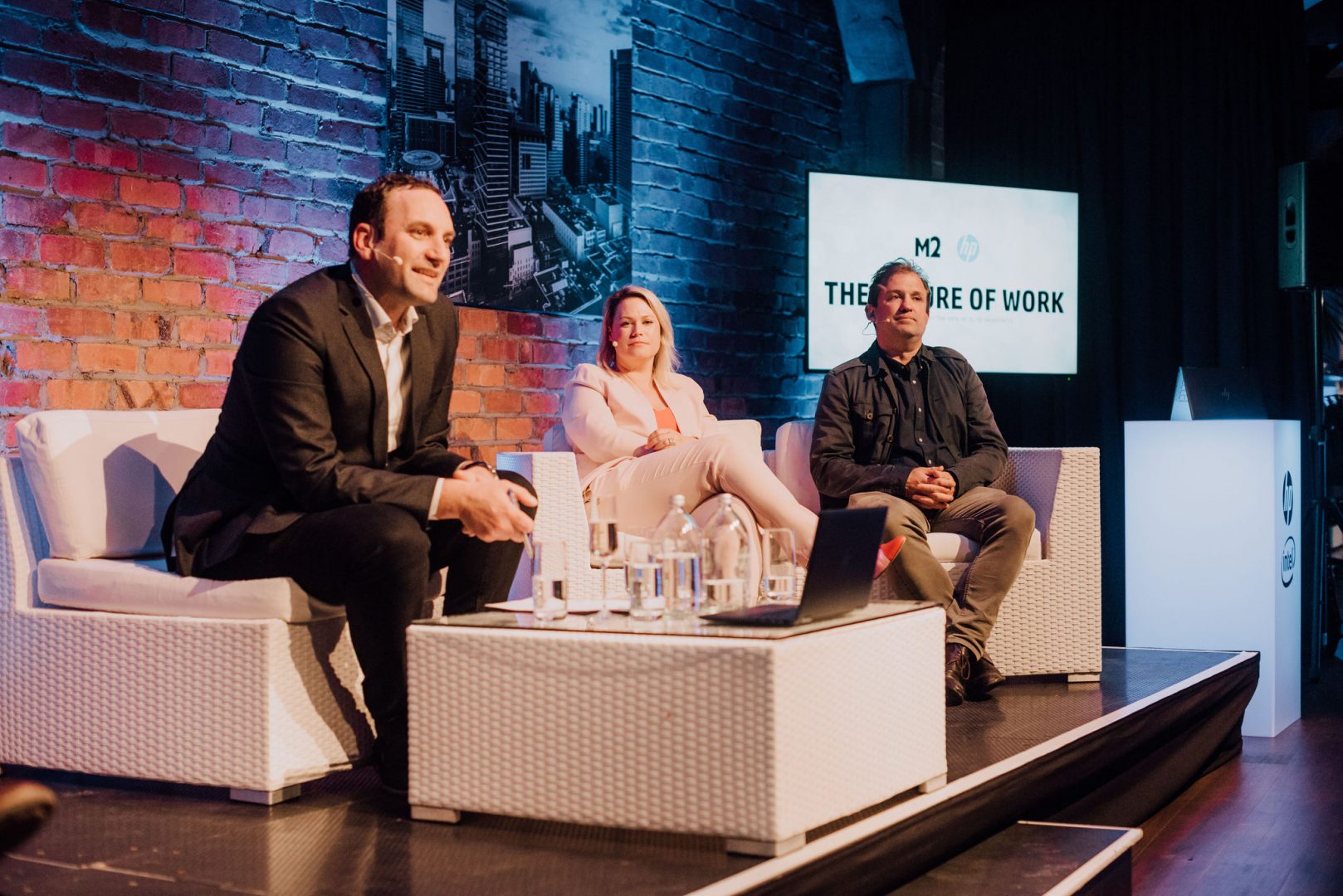
Do you think that in the future you might be able to get AI creations that make movies?
Andy Dharmani: Oh, maybe, but I think that humans will do something else that is more complex and better. I think humans will always be leading in terms of creativity and even technology. It all starts with creativity. It starts from the idea, it starts from when you’re in the shower, you think about something and I don’t think that can be replaced. Maybe not any time in the near future.
You’ve seen Terminator, right? Is there a part of you that’s worried about planting the seed for a whole lot of killer, Austrian-sounding robots?
Andy Dharmani: I’m solving very simple business problems right now [laughs]. If you spend your time thinking like that, definitely. I’m sure there’ll be somebody smart with that kind of mind that will want to do that and I think they will be able to if they want to.
Is there need for some element of responsibility? Is there a part of you that is conscious of what you are creating?
Andy Dharmani: Yeah, absolutely. But I don’t think we can rely on that as a society. I can say I’m responsible for what I’m doing, but I’m sure I cannot stop the world from doing what they are doing. We are accountable and responsible, but I don’t think you can be responsible as a society. There would be people who want to do things differently. I don’t think they can stop that. We just need to prepare for that.
Melanie Reece: That absolutely terrifies me. Having come from an industry where Facebook disrupted it and decimated every newsroom, not only in New Zealand, but throughout the entire world. There was no way we could have foreseen the emergence of hate crimes, the live streaming of a massacre in our own country, the dastardly ability to interfere in elections.
I worked with an AI company three years ago to launch them to New Zealand, and there was a Twitter fight going on at the time between Mark Zuckerburg and Elon Musk. Elon was calling Mark out for being really naive, and this was before any of the Cambridge Analytica stuff, before the Russian interference. He was calling Mark out for being really naive and he said, ‘AI has the ability’, and Mark was saying that it has the ability to go horribly, horribly wrong. It was this very public Twitter spat and then the same feed, as I’m getting heavily involved in that and getting quite outraged by Mark’s naive response, an article came up on my feed that was about South Korea weaponising AI. They’re already making robots that can think for themselves with military weaponised AI, it exists in the world right now. God knows where they’re at now. However, it also does unbelievable good.
When you think about the trajectory of Facebook, what started out as this platform to rank the prettiness of college girls, has it become something that starts to control the elections and a whole lot more. But, there is potential for so much good as well in terms of technology, like AI.
Andy Dharmani: Absolutely. I think it’d be 99% used for good and that’s how the technology is. There’ll be elements, you can always misuse things. It’s not just technology, it’s anything. 99% of people drive quite good, but there is 1% who don’t. It would be similar in AI or any technology.
Moving from AI to blockchain. Does it irritate you when people just automatically associate Bitcoin with blockchain, when there’s so much more to the world of blockchain and the potential impact on industries?
Andy Higgs: No, not really.
Is now a good time to buy a Bitcoin?
Andy Higgs: I think you’ve got to accumulate Bitcoin. Bitcoin is digital gold. It’s not for spending, just like we don’t spend gold every day. Bitcoin’s really the first mainstream example of a decentralized autonomous organisation. So what that means is there’s no CEO, there’s no middle management, there is no head of product, there is no head of marketing. It’s run by the community.
The ecosystem around Bitcoin has developers that update the code base. It’s got infrastructure providers, which are the miners and the network providers. It’s got investors who contribute liquidity and believe the Bitcoin story. And then it’s got the people that own Bitcoin, consumers and people that might spend it or they might just be holding it because of this digital culture that’s growing. It’s probably gone much further than the creator, whoever he or she is, thought it might go. But it’s a really good example of how that can work and how a community can control something.
And it can’t be killed. It’s like the internet, it’s like mobile phones. Governments can’t control those corporates. Corporations can’t control it. If you look at Facebook’s attempt to corporatize money with their partners, who are really just hedging their bets because the Visas and the Mastercards of this world were worried that they’re going to be out of business if they didn’t get on board the next train. It shows the power and it’s a validation of blockchain.
This is why privacy is important. There’s lots of economic reasons why you want to own your own data because data is gold. But if you let all your data are out there and let the big data driven platforms control your life and the level of manipulation by these platforms is off the scale already, they take us down paths we don’t want to go as a society. But, once you control the data, you can turn that AI off.
In the future, you won’t need advertising. You’ll have AI that goes out and finds you what you need. You might need to go searching through Google, AI’s will do that, but you want to be in control of that. That’s why you want to control your history, your transaction history.
That’s really what blockchain enables. There’s no central authority that’s in control and you move into this open world where you can have privacy, but you can also have collaboration. What blockchain enables is collaborations across the value chain.
Supply chains is an early-use case. Identity is a really good one that gives you that access control around your data. These are conversations that are happening now. These are projects that are still at pre-production stage. We talk about prototyping.
It comes back within the next three to five years, certainly this is going to become a thing. You’ll have your own digital wallet. The digital wallet will have all your assets, it’ll have your currencies, it’ll have your loyalty points, it’ll have your tickets, it’ll have anything digital. We’ll be in this internet of value and you’ll be earning and burning all the time.
We’ve been having conversations with the reserve bank. We’ve been having conversations with the healthcare providers; us middle-aged white males will be getting paid or rewarded for riding a bike to work to fend off the diabetes, or whatever it is that’s about to afflict us. This is what blockchain enables.
I think we are going to get some good leadership in New Zealand, but there has been an absence of good leadership, both in the private sector and the public sector. Real leadership. We’ve got the figureheads that do a good job for our brand. I love the idea of a 37-year-old woman running the country. But, the reality is our hard earned tax dollars aren’t being that well spent and the GST we pay has massive surplus.
We’re well-governed, a lot of countries around the world are not so lucky. Countries like Venezuela need these community-controlled currencies. It’s only a matter of time before we look to find things in different ways. Local government, most of them are right at the edge of their credit limits. They’ll try and tax us more, but there’s only a limit to how much we can pay.
We are going to have to get more efficiency and that’s the promise of this technology. I think Bitcoin has been good. Even Trump has been tweeting about it! It’s definitely got people’s attention, but it’s what’s coming next which is really exciting. It’s a shame Facebook don’t have the right people to lead it. But, I think we’ve got the values to show the world what this could look like. We have lots of really interesting conversations around this country about where it could head.
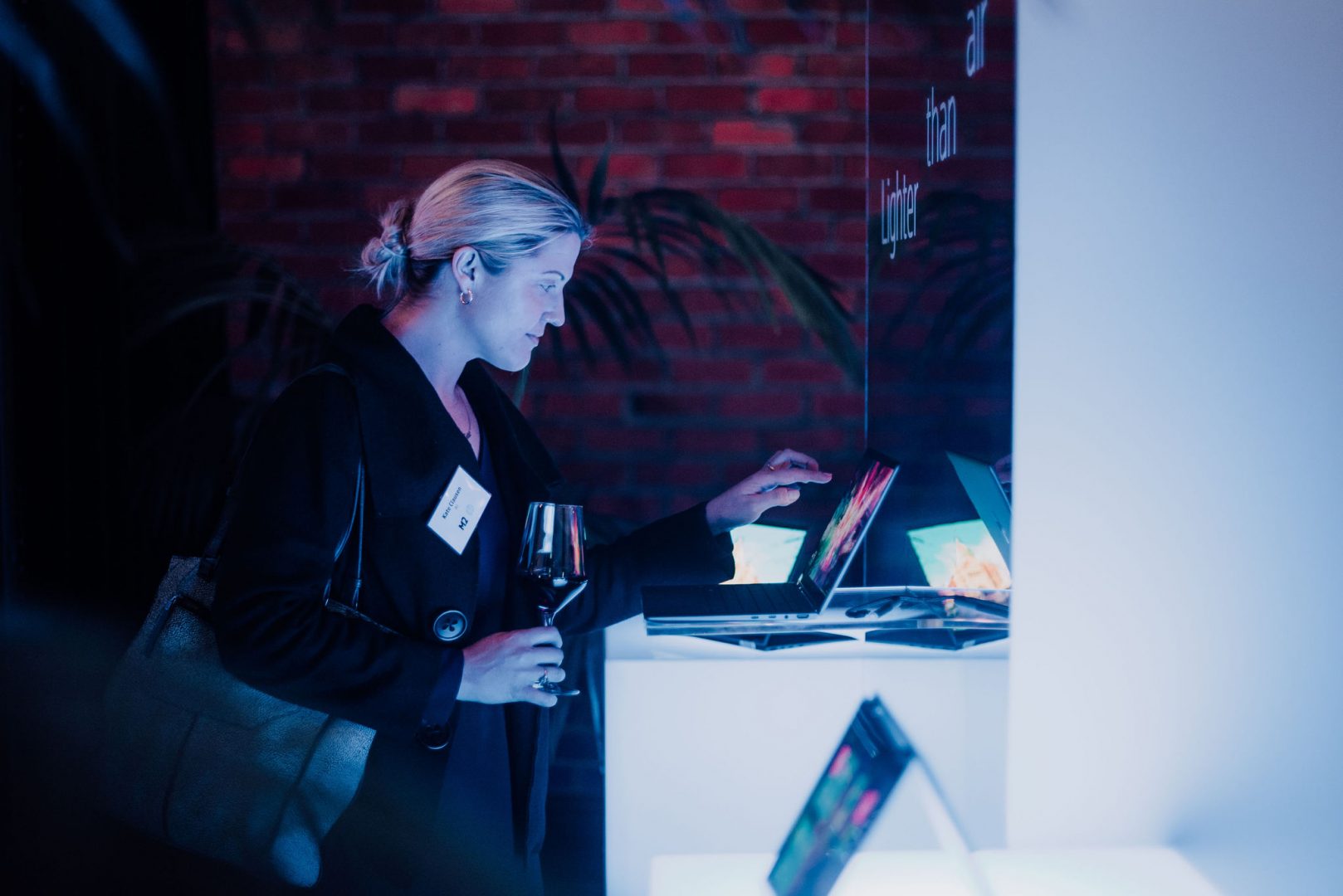
Any insider tips for people in the room in terms of a potential industries to look at?
Andy Higgs: I think Fintech’s really interesting. What we were excited about with Facebook was this market of two and a half billion consumers that you could access from New Zealand. For someone like Kathryn, it would just make your business so easy. All the issues around collecting foreign exchange receipts and all the marketing, you’ve just got this huge captive market.
I think that that will happen. Libra’s not dead and so you’ve got to look at the opportunity. We’re actually having a conversation with the product people at Libra about how to do data differently. Whether that goes anywhere or not, that’s another matter. We’re interested in that.
In terms of other industries, I just think that the potential in startup land is amazing. If I look at our token, and this is public, we’re up 900% in the last three weeks and that’s what can happen in the space. Millennials, Generation Z , they are investing, they’re used to holding these currencies. That’s how they’re going to beat the property market. You don’t need to sit on a whole lot of leverage to double your money, triple your money. This is where it’s at really.
It is very volatile and this year’s been a bit of a bearish year. But there are some, glimpses of green shoots and I think next year’s going to get more interesting and then the year after that, it’ll get more interesting. We’ve done research around this and everyone’s interested in it because they know it is the future of money, it’s just a question of what level. We need more proof points, there’s not enough proof point.
Travel’s a really interesting one because it’s a global industry. I think this is why creativity is going to be so valuable because if you’ve got a good idea, you’re going to have these huge markets that you can access using Instagram and then selling very easily through these global marketplaces which are facilitated by these more efficient ways of moving value around.
Kathryn, are you finding that things have really opened up in terms of the access that you have to the global market?
Kathryn Wilson: I’d like to think so. It’s an awareness thing. As a New Zealand brand, we’ve got such a loyal following here and a lot of nurturing from our local media. But once you get into global markets, they like to know the named brands often in the bigger markets.
For me, it’s been a decision to be based in New Zealand, because I can’t think of a better place to live, but to be in other markets at that level, it’s different than having to front it, be the brand, turn up at the parties.
In terms of the consumer, sure we’re sending out on e-commerce globally. But if we were to consider a distribution centre in another market, it means it’s a different operation to what we have here because we are talking to essentially a small top of the triangle; people that love our product and love the romance of our product.
Our shoes are limited edition, all of our shoes are handmade and we love that because they’re drawn with pencil on paper. In saying that there’s access to it if someone loves it and they see it. It’s exciting to think that there’s a lot more opportunity to get different channels now and get people wearing them.
While you’ve still got the pencil to paper kind of thing, can you talk about the way that you’ve used technology from a small business sense in order to increase a work flow and being able to work from the bach?
Kathryn Wilson: That’s everything, isn’t it? I have 20 staff. We’re a small team. I’ve got two children, one’s six months old, one is nearly starting school and so I’m in the trenches of that happening at home. But also I think that every second that I’m on, you have to make that 100% commitment to being with the little ones, not looking at your emails and not looking at your phone.
When I am in the office or my office being the Pauanui beach house, you’re 100%. I think it has to come with you wherever you are. If I’m working out of a hotel room, I can look at my inventory stock system running live real time from eCommerce and looking at our retail stores, everything’s live.
That has to be something that you can work in so many different ways in different places. A big part of that is that either on your device, on your notebook, and within the team, we’re all on one drive and we’re all talking to each other constantly in real time. There’s no time to shut something, save it, and you open it. We like to think that we’re becoming more and more portable.
We hand draw our shoes, but everything then gets scanned, using programs to communicate that back to our manufacturers. We manufacture in five different countries at the moment. They’re not English-speaking and I don’t speak five fluent languages, so we’re relying on dimensions, drawings, programs, to communicate that visually. There’s always going to be more and more shortcuts and a way of communicating that better.
I’m the lucky one because I’ve got the privilege of living here and then I get to talk to a global world of consumers. But our manufacturer, suppliers, all the components, unfortunately cannot be done in New Zealand. I would if I could, but from 2002, we’ve always worked with international manufacturers because there is no industry here. It was just the norm to be talking over a computer screen.
Andy, in terms of creating the magic here and connecting to the world, you are doing some really cutting edge technology. Is there a benefit of being so removed from the rest of the world geographically?
Andy Dharmani: There is benefit in a way. The startup scene in Auckland is really amazing. It is really innovative. When I talk to my friends in the US, it’s far easier to find people here. It’s far cheaper actually than the likes of US. Another big benefit is that you can move really fast. The businesses are smaller in size. If I was to compare Walmart and The Warehouse, The Warehouse would be far faster, I’m certain about that.
I think you can test out your technology, you can move really quickly, but really, to be successful, you have to eventually start finding customers overseas. Especially with technology like this or probably even blockchain.
With the kind of investment you need to build some of these things, you really need to find bigger customers eventually. It is a great testing ground, it will always be a great place to develop things. But when it comes to customers for technology companies, I think it is definitely worth stepping out to other countries as soon as practically possible.
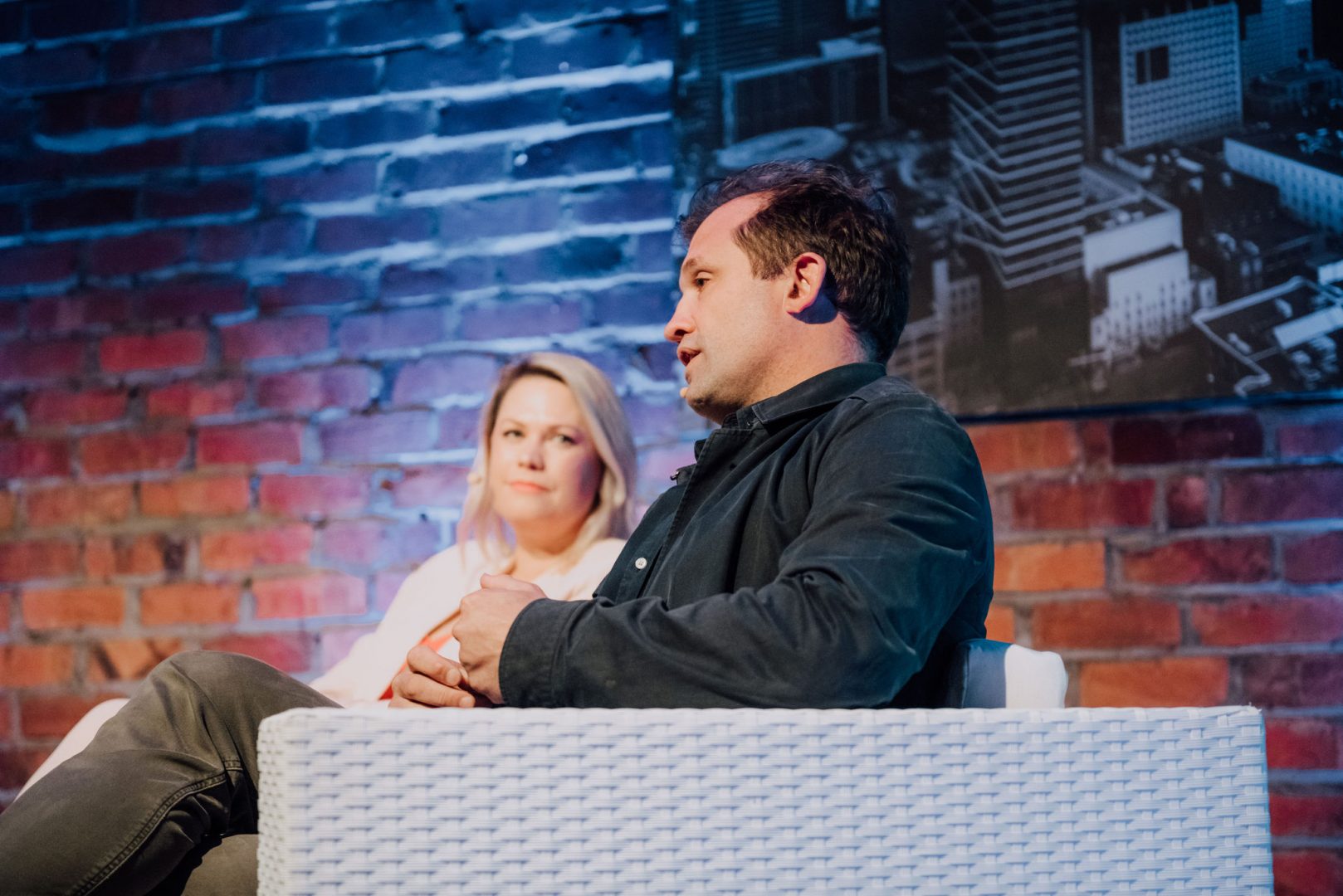
Melanie, can you talk about a shift in mindset that it takes to go from being at the mercy of technology to being at the cutting edge of it?
Melanie Reece: I was in broadcast television when the internet came in and I was incredibly excited to imagine the broadcast of the television set, but also have the direct access to the consumer. That excitement and that thirst for innovation at that disruptive moment in time formed my whole career.
It’s because I got genuinely excited about the opportunities for media to be disrupted. Because I was young and eager and didn’t know any better, I’d put my hand up to figure out how to connect the dots between broadcast television and the internet. That really did inform my whole career and I got totally hooked on innovation.
My three rules for innovating within the company that you’re in is remain really, really curious and read all the blogs, read all the magazines, all the Ted talks. If there’s a new technology that really interests you, go out there and find about that. The second one is put your hand up to bring the new technologies together. What I found was when it’s a new technology, it holds so much promise. But you pay people and assume that someone will take care of it. And that’s not the case. I’m a commercial person, so I have to figure out with the new technology how to make money out of it. I’m a good person to put my hand up. Put your hand up to be on the team to figure this stuff out. Don’t assume that someone else is doing it. And then the other thing I’ve done is aligned myself in the company for the person that can enable me personally to innovate. I’ve either asked for someone to mentor me or I’ve put a business case together or I have pitched for the funding to actually do the innovation project that I have wanted to do with it.
We were innovating at the height of the GFC and the only reason MediaWorks still exist to this day is because we innovated our way out of bankruptcy. So a thirst for innovation and putting your hand up to do it in aligning yourself with the right people to fund it is; that’s my learnings and and the really wonderful thing for me is all of that has now translated beautifully into my next career.
I’ve been in startup for five years. I did three startups while I was in media. I always knew at the end of my media career that I would be on the board of directors somewhere. But that thirst for innovation has translated beautifully into start up world because I’m capital raising. I’m introducing and explaining new technologies. It all translated absolutely beautifully.
I think the moral of the story is not expect that someone else with these brand new emerging technologies will know what to do with them. You’ve got to get a team together to figure it out. And New Zealanders are really good at that. The CEO at Centrality is known as a world leader in blockchain thinking because I think Kiwis are really ingenious because we live at the bottom of the world and we think differently to everyone else. I think that’s a huge, huge plus for the ecosystem here.

Want to know more about the future? Have a look at our M2 Summit

